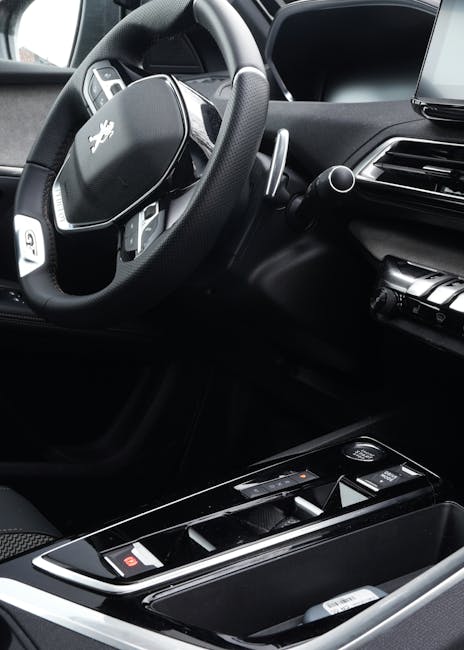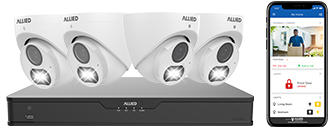Introduction to Smart Security Systems
In recent years, smart security systems have become a pivotal component in safeguarding residential properties. A smart security system utilizes modern technology such as Internet of Things (IoT) devices, artificial intelligence, and mobile connectivity to provide robust and comprehensive security solutions. These systems are designed to offer enhanced monitoring, better control, and improved response times compared to traditional security measures.
Smart security systems typically incorporate a range of devices including smart cameras, sensors, alarms, and automated locks. These devices are interconnected and can be controlled remotely via smartphones or computers. With the integration of high-definition video surveillance, motion detection, and instant alerts, homeowners can monitor their properties in real time, regardless of their physical location.
The sophistication and convenience of smart security systems have rendered them increasingly popular among homeowners. According to Statista, the global market for smart homes, which includes smart security systems, is expected to grow from $79.13 billion in 2020 to $313.95 billion by 2026. This indicates a significant shift towards the adoption of these technologies.
Moreover, the advancements in wireless technologies have significantly contributed to the ease of installing and managing these systems. For instance, Wi-Fi and Bluetooth connectivity allow for seamless integration of devices without the need for extensive wiring. This technological infrastructure supports functionalities like real-time streaming, remote arming and disarming, and integration with other smart home devices such as lights and thermostats.
Furthermore, brands such as Ring, Arlo, and Google Nest have played a crucial role in popularizing smart security systems. These brands offer user-friendly products that cater to various security needs, from basic setups to comprehensive security ecosystems. Consumer reports suggest that smart security products from these brands are rated highly for their reliability and effectiveness.
This level of accessibility to cutting-edge security technology has made smart security systems an attractive option for homeowners seeking peace of mind. As the technology continues to evolve, it is expected that the features and capabilities of these systems will only improve, encouraging even greater adoption and providing an ever-increasing array of security options for consumers.
Rise in Home Security Concerns
Home security concerns have seen a significant rise in recent years, driven by several factors contributing to the growing demand for robust solutions. One foremost factor is the increasing frequency of residential burglaries. According to the Federal Bureau of Investigation (FBI), there were over 1 million burglaries reported in the United States in 2019, with a substantial percentage occurring in residential properties. This trend has underscored the need for homeowners to seek more effective security measures.
In the Dallas-Fort Worth (DFW) area, crime rates have also had a noticeable impact on how residents perceive home security. Data from the Texas Department of Public Safety illustrates a varied landscape, where some neighborhoods experience higher crime rates compared to others. Such disparities have resulted in heightened awareness and concern among DFW homeowners about the vulnerabilities of traditional security measures.
Another contributing factor to the rise in home security concerns is the increasing media coverage of home invasions and other related crimes. Media reports often highlight the deficiencies in older security systems and the sophistication of modern criminal tactics, influencing public perception and emphasizing the need for advanced security solutions.
The emergence of new technologies and the proliferation of the Internet of Things (IoT) have further amplified concerns about home security. With more devices connected to the internet, there is an increased risk of cyber intrusions and breaches. This dual threat of physical and cyber vulnerabilities requires a more comprehensive approach to home security, which traditional systems may lack.
Moreover, social factors such as urbanization have played a role in amplifying security concerns. As individuals move to urban centers like DFW, the density of residential areas increases, potentially leading to a higher risk of encounters with crime. This shift has prompted many homeowners to reevaluate their security needs, considering the changing dynamics of their living environment.
Finally, the psychological impact of securing one’s home cannot be overlooked. Surveys conducted by various independent organizations indicate that a significant portion of homeowners value peace of mind as a primary reason for investing in advanced security systems. The reassurance that comes from knowing their home is protected against possible threats is a compelling factor driving the switch to smarter, more reliable security technologies.
In summary, the rise in home security concerns among DFW homeowners can be attributed to increasing burglary rates, media influence, technological vulnerabilities, urbanization, and the intrinsic need for peace of mind. These elements collectively create a strong impetus for seeking out more advanced, reliable security solutions.
Benefits of Smart Security Systems
Smart security systems offer a range of advantages that address the specific needs of homeowners in the Dallas-Fort Worth (DFW) area. These benefits extend beyond traditional security measures, providing enhanced protection, convenience, and peace of mind.
Increased Security Features
One of the main benefits of smart security systems is their sophisticated features, which often include real-time alerts, surveillance, and remote control capabilities. These systems can be customized to suit the specific security concerns of individual homeowners.
- Real-Time Alerts: Homeowners receive immediate notifications on their smartphones if any unusual activity is detected.
- Remote Surveillance: High-definition cameras provide live feeds that can be monitored from anywhere.
- Automated Responses: Systems can automatically lock doors, turn on lights, and sound alarms in response to
security breaches.
Integration with Other Home Devices
Smart security systems seamlessly integrate with other smart home devices, creating a cohesive and automated home environment. This integration helps in managing multiple aspects of home security and convenience through a single platform.
Key integration capabilities include:
- Smart Locks: Allowing homeowners to lock and unlock doors remotely.
- Lighting Controls: Automatically adjusting indoor and outdoor lights based on activity detection.
- Voice Assistants: Using devices like Amazon Alexa or Google Assistant to control the security system with voice commands.
Data and Statistics
The effectiveness and benefits of smart security systems are supported by data and statistics, reflecting their impact on reducing crime and increasing homeowner satisfaction.
| Feature | Percentage of Users Reporting Benefit |
|---|---|
| Improved Sense of Security | 85% |
| Reduction in Theft and Vandalism | 60% |
| Remote Monitoring Utilization | 75% |
| Ease of Integration with Other Devices | 70% |
Energy Efficiency and Cost Savings
Another benefit is energy efficiency. Smart security systems can be configured to turn off lights, adjust thermostats, and manage other connected devices when the home is unoccupied. This leads to significant cost savings on utility bills.
- Automated Energy Management: Reducing waste by managing energy use intelligently.
- Lower Utility Bills: Homeowners can potentially save a considerable amount on energy costs annually.
Overall, the adoption of smart security systems in the DFW area is fueled by these robust and comprehensive benefits that not only enhance security but also integrate seamlessly with modern lifestyles and smart home environments.
Technological Advancements Driving Adoption
The rapid technological advancements in recent years have significantly contributed to the growing adoption of smart security systems among homeowners in the DFW (Dallas-Fort Worth) area. These advancements have not only made these systems more effective but also more accessible and user-friendly.
One of the key technological advancements is the integration of Internet of Things (IoT). IoT enables various devices to communicate with each other, creating a more cohesive and comprehensive security network. For instance, smart sensors can detect unusual movements and immediately notify the homeowner through a connected smartphone application. This real-time communication enhances the efficiency of home security systems, providing peace of mind to homeowners.
Another major development is in the area of artificial intelligence (AI) and machine learning. These technologies allow security systems to learn the regular patterns of household activities and identify anomalies. This capability is particularly beneficial in identifying potential security threats, as AI can discern between normal and suspicious activities with greater accuracy over time. In addition, AI-driven systems can automate responses, such as locking doors or alerting authorities, thereby providing an additional layer of security.
Advancements in camera technology have also made significant contributions to the rise in smart security system adoption. Modern security cameras are equipped with high-definition capabilities and night vision, providing clear footage regardless of the time of day. Many cameras also come with motion detection and facial recognition features, which add to their efficacy in preventing unauthorized access.
The development of cloud storage solutions is another factor driving the popularity of smart security systems. Homeowners no longer need to worry about the physical storage of security footage. Cloud storage provides a convenient and secure way to store and access video recordings, ensuring that important evidence is not lost or tampered with. Many security systems offer cloud storage as part of their subscription packages, further simplifying the process for users.
Moreover, improvements in mobile technology have enhanced the usability of smart security systems. Mobile applications allow homeowners to monitor their properties remotely, receive instant alerts, and even control security devices from virtually anywhere. This level of control and convenience is highly appealing to modern homeowners who prioritize flexibility and ease of use.
Overall, the advancements in IoT, AI, camera technology, cloud storage, and mobile applications have collectively played a crucial role in driving the adoption of smart security systems among DFW homeowners. These technologies have made security systems more efficient, reliable, and user-friendly, meeting the evolving needs of contemporary households.
Cost-Benefit Analysis
The decision to invest in a smart security system often hinges on a thorough cost-benefit analysis. Potential buyers want to know if the financial outlay will be justified by the tangible and intangible returns they receive. When performing this analysis, it’s essential to consider both the visible costs and the multifaceted benefits.
Initial and Ongoing Costs
The cost of smart security systems can vary widely depending on the complexity and features of the system. Initial expenses generally include:
- The purchase price of the equipment (cameras, sensors, smart locks, control panels, etc.).
- Installation fees, either for professional installation or DIY kits.
Beyond the initial setup, homeowners should also account for ongoing costs such as:
- Subscription fees for monitoring services, often billed monthly or annually.
- Maintenance costs for keeping the system in optimal condition.
Data from sources such as Consumer Reports suggest that the average initial setup cost ranges between $300 to $1,500, while ongoing costs for monitoring services can be around $10 to $50 per month.
Benefits and Savings
On the benefits side, smart security systems offer several key advantages:
- Enhanced Security: Immediate alerts and real-time monitoring can deter crime and facilitate a rapid response from authorities in emergencies.
- Potential Insurance Discounts: Some insurance providers offer premium reductions for homes equipped with advanced security systems. These discounts can range from 5% to 20% of the insurance cost.
- Increased Property Value: A home with an advanced security system can be more attractive to potential buyers, potentially increasing resale value.
- Peace of Mind: Knowing one’s home is protected can significantly reduce stress and anxiety for homeowners.
Studies show that homes without security systems are up to 300% more likely to be broken into. Therefore, the protective benefits introduced by a smart security system can be substantial.
Comparative Financial Impact
When comparing the costs and savings, it becomes evident that the financial impact of investing in a smart security system can be favorable. For instance, the cost of losses from a home break-in (which may include stolen property, property damage, and emotional distress) can far exceed the annual expense of a smart security system subscription.
Furthermore, according to research by the National Council for Home Safety and Security, the average loss per burglary incident is $2,799. This figure underscores the value of preventative measures that smart security systems can offer.
Conclusion
In conclusion, while the upfront and ongoing costs of smart security systems are notable, the financial benefits—including reduced insurance premiums, potential property value increases, and avoided losses due to crime—can outweigh these expenses. Homeowners considering this investment should conduct a personalized cost-benefit analysis, accounting for their specific circumstances and the level of security they desire.
Influences from Local Crime Rates
According to recent crime data, local crime rates have a significant impact on the adoption of smart security systems by homeowners in the Dallas-Fort Worth (DFW) area. Data from the Federal Bureau of Investigation (FBI) shows that as of the latest reporting period, the DFW metroplex has experienced fluctuating crime rates, particularly in property crimes such as burglaries and thefts.
Fort Worth Police Department and Dallas Police Department statistics indicate a growing concern among residents regarding home invasions. In 2022, Fort Worth reported over 3,000 burglaries, while Dallas recorded nearly 4,500 burglary incidents within city limits. This uptrend in property crimes is one of the core reasons why homeowners are seeking advanced solutions to bolster their security.
Smart security systems offer innovative solutions that address these concerns. According to a survey by the Security Industry Association (SIA), 62% of respondents believe that smart security systems are more effective in preventing burglaries compared to traditional security setups. Features like real-time surveillance, remote monitoring, and automated alerts directly contribute to enhanced security, deterring potential intruders.
Moreover, a report by SafeWise elaborates that neighborhoods in DFW with higher adoption rates of smart security systems have seen a measurable decline in certain types of crime. For instance, communities where over 50% of homes are equipped with these systems reported a 25% reduction in property crimes over a two-year period.
The influence of local crime rates is also evidenced by increasing public awareness and community initiatives. Law enforcement agencies in the DFW area often promote the adoption of smart security technologies through public safety campaigns, encouraging residents to upgrade their security apparatus as a proactive measure.
Additionally, Home Insurance companies in Texas have started to offer discounts for properties equipped with smart security systems, further incentivizing homeowners to make the switch. Data from the Insurance Information Institute denotes a potential 5-15% reduction in annual premiums for homeowners utilizing these advanced systems.
These influences underscore the relationship between rising local crime rates and the decision of DFW homeowners to invest in smart security systems. By mitigating the risks associated with property crimes and enhancing overall safety, smart security systems represent a compelling choice for the modern homeowner.
Future Trends in Home Security
The future of home security systems is expected to be shaped significantly by advancements in technology and the growing demand for more effective security solutions. One of the most notable trends is the integration of Artificial Intelligence (AI) and Machine Learning (ML) in security systems. These technologies enhance the capability of security systems to recognize patterns, predict potential threats, and respond automatically.
Another emerging trend is the increased use of Internet of Things (IoT) devices. IoT enables various home devices to communicate and work in unison, creating a more holistic and responsive security ecosystem. For example, smart cameras, doorbell cameras, and sensors can work together to provide real-time alerts and video feeds to homeowners, giving them better control and visibility over their property.
Cloud-based storage solutions are also becoming more popular. These solutions offer several advantages, including the ability to access and manage video footage remotely and to ensure data is kept secure and backed up off-site. This trend is expected to grow as more consumers look for reliable and convenient ways to store and manage their security data.
Moreover, the use of biometric authentication methods such as facial recognition and fingerprint scanning is anticipated to rise. These methods provide a higher level of security compared to traditional passwords or PIN codes, as they are harder to replicate or steal.
5G technology is likely to play a crucial role in the evolution of smart security systems. The increased bandwidth and faster speeds offered by 5G will enhance the performance of security devices, allowing them to transmit higher-quality video and data with less latency. This improvement will enable more rapid and effective responses to security incidents.
The future will also see an emphasis on cybersecurity in home security systems. As smart devices become more interconnected, the risk of cyber threats increases. Security companies are expected to develop more robust encryption methods and security protocols to protect against
hacking and unauthorized access.
Another notable trend is the development of more sustainable and energy-efficient security solutions. Innovations such as solar-powered cameras and low-energy sensors are being designed to meet the growing demand for environmentally friendly technology.
Finally, the trend towards user-friendly interfaces will continue. Companies are focusing on making their systems more intuitive and easier to use, ensuring that homeowners can manage their security without needing advanced technical knowledge.
Overall, the future trends in home security are geared towards creating systems that are more intelligent, efficient, and user-friendly. As technology continues to advance and consumer demands evolve, smart security systems will play an increasingly pivotal role in ensuring the safety and security of homes across DFW and beyond.













